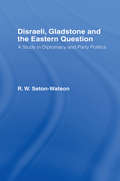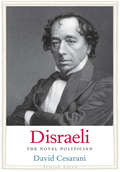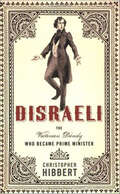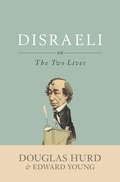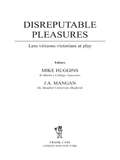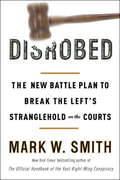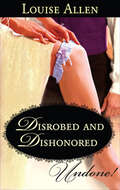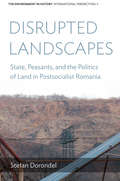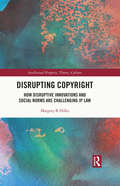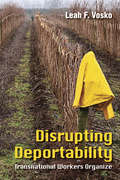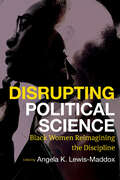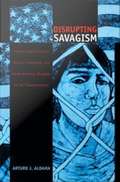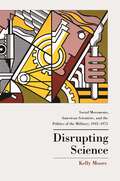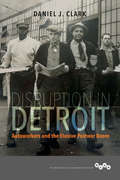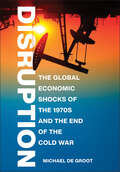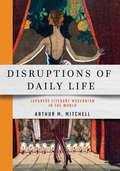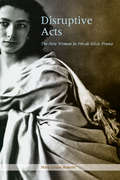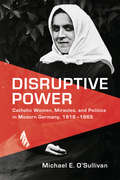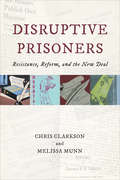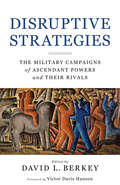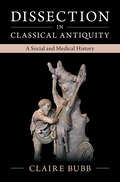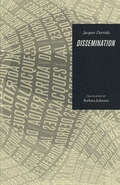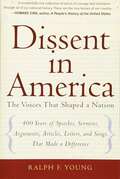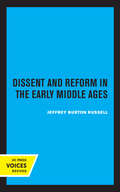- Table View
- List View
Disraeli, Gladstone & the Eastern Question (Norton Library #Vol. 594)
by R. W Seton-WatsonPublished in the year 2004, Disraeli, Gladstone & the Eastern Question is a valuable contribution to the field of History.
Disraeli: The Novel Politician
by David CesaraniLauded as a "great Jew," excoriated by antisemites, and one of Britain's most renowned prime ministers, Benjamin Disraeli has been widely celebrated for his role in Jewish history. But is the perception of him as a Jewish hero accurate? In what ways did he contribute to Jewish causes? In this groundbreaking, lucid investigation of Disraeli's life and accomplishments, David Cesarani draws a new portrait of one of Europe's leading nineteenth-century statesmen, a complicated, driven, opportunistic man. While acknowledging that Disraeli never denied his Jewish lineage, boasted of Jewish achievements, and argued for Jewish civil rights while serving as MP, Cesarani challenges the assumption that Disraeli truly cared about Jewish issues. Instead, his driving personal ambition required him to confront his Jewishness at the same time as he acted opportunistically. By creating a myth of aristocratic Jewish origins for himself, and by arguing that Jews were a superior race, Disraeli boosted his own career but also contributed to the consolidation of some of the most fundamental stereotypes of modern antisemitism.
Disraeli: The Victorian Dandy Who Became Prime Minister
by Christopher HibbertTo Thomas Carlyle he was "not worth his weight in cold bacon," but, to Queen Victoria, Benjamin Disraeli was "the kindest Minister" she had ever had and a "dear and devoted friend." In this masterly biography by England's "outstanding popular historian" (A.N. Wilson), Christopher Hibbert reveals the personal life of one of the most fascinating men of the nineteenth century and England's most eccentric Prime Minister. A superb speaker, writer, and wit, Disraeli did not intend to be a politician. Born into a family of Jewish merchants, Disraeli was a conspicuous dandy, constantly in debt, and enjoyed many scandalous affairs until, in 1839, he married an eccentric widow twelve years older than him. As an antidote to his grief at his wife's death in 1872, he threw himself into politics becoming Prime Minister for the second time in 1874, much to the Queen's delight.
Disraeli: or, The Two Lives
by Edward Young Douglas HurdBenjamin Disraeli was the most gifted parliamentarian of the nineteenth century and a superb orator, writer and wit - but how much do we really know about the man behind the words?'As Douglas Hurd and Edward Young point out in their splendidly written, finely judged and thoroughly persuasive book, a vast chasm yawned between the real Disraeli and his posthumous reinvention' Dominic Sandbrook, SUNDAY TIMES'Not only, they tell us in this vigorously debunking romp through his political life, did he never use the phrases "One Nation" or "Tory Democracy", he was actively hostile to the concepts that they are now understood to represent' Sam Leith, THE SPECTATOR'The book is more a study in character . . . than a staid political narrative. As a result, Disraeli: Or the Two Lives is full of unexpected jolts and paradoxes . . . It proves an unflagging pleasure to read' Richard Davenport-Hines, GUARDIAN'So intoxicating that you will find yourself snorting it up in one go, as I did, with great pleasure' Boris Johnson, MAIL ON SUNDAY
Disraeli: or, The Two Lives
by Edward Young Douglas HurdBenjamin Disraeli was the most gifted parliamentarian of the nineteenth century and a superb orator, writer and wit - but how much do we really know about the man behind the words?'As Douglas Hurd and Edward Young point out in their splendidly written, finely judged and thoroughly persuasive book, a vast chasm yawned between the real Disraeli and his posthumous reinvention' Dominic Sandbrook, SUNDAY TIMES'Not only, they tell us in this vigorously debunking romp through his political life, did he never use the phrases "One Nation" or "Tory Democracy", he was actively hostile to the concepts that they are now understood to represent' Sam Leith, THE SPECTATOR'The book is more a study in character . . . than a staid political narrative. As a result, Disraeli: Or the Two Lives is full of unexpected jolts and paradoxes . . . It proves an unflagging pleasure to read' Richard Davenport-Hines, GUARDIAN'So intoxicating that you will find yourself snorting it up in one go, as I did, with great pleasure' Boris Johnson, MAIL ON SUNDAY
Disreputable Pleasures: Less Virtuous Victorians at Play (Sport in the Global Society #Vol. 51)
by Mike Huggins J. A. ManganMany historians have claimed that respectability was the sharpest line of social division in Victorian society, even that the line between the 'respectable' and 'unrespectable' was more significant than between rich and poor. This irreverent and revisionist collection argues that they have over-polarised Victorian attitudes and challenges the conventional view that middle-class Victorian leisure had a respectable and serious purpose and approach. Disreputable Pleasures explores the more sinful and unrespectable Victorian male sporting pleasures, demonstrating the complex interrelationships between such value as manliness, muscularity and machismo, or sensuality, virility and hedonism. It sheds light on the ways in which the public rhetoric of Victorian respectability could be rendered problematic by the practical pursuit of private pleasures. It shows that Victorian leisure was much more contested cultural space than has been recognised, a battleground whose contestants ranged from the rational recreationalist to the avowedly hedonistic, and from the sacred to the profane.Disreputable Pleasures poses a powerful challenge to the accepted public image of Victorian society and will greatly add to our present understanding of Victorian Britain.
Disrobed
by Mark W. SmithHow to Bring the Reagan Revolution to America's Courts... Finally. With the Harriet Miers fiasco a distant memory and John Roberts and Samuel Alito sitting on the Supreme Court, conservatives can finally stop worrying about the courts, right? Wrong. Dead wrong. America's courts, legal culture, and law schools remain solidly in the Left's camp. Decades of liberal legal precedents fill volumes of law tomes. Absent a sweeping change-precisely what bestselling author Mark W. Smith calls for in Disrobed- liberals will ruthlessly exploit their dominant position in the law to continue advancing their radical agenda, as they have for the past seventy years. Smith, a nationally recognized attorney, lays out an aggressive new battle plan to thwart the liberal assault on America by turning the courts into allies of the conservative movement. Be warned,Disrobed is not for the fainthearted. Smith implores conservatives: Toss out practically everything you think you know about courts, judges, and American law- because it's naive, anachronistic, and self-defeating. Fearlessly challenging the conventional conservative wisdom, Disrobed reveals: * Why conservatives must immediately embrace- not decry- judicial activism * A bold new model for finding strong conservative judges- behold the "Judicial Reagan" * Why litmus tests, so often vilified, represent the only way to pick reliable conservative judges * How to get sitting judges to "evolve" (finally!) to the right * How the Right can sue more to advance the conservative agenda- on guns, taxes, immigration, the right to life, you name it * How conservatives can turn liberals' favorite court rulings against them * The hard truth that who wins in the courts often depends more on politics and ideology than on the rule of law Smith reminds us that courts, judges, and lawyers need not be enemies of the Right, and can even serve as valuable allies in the war against liberalism. But as his groundbreaking book shows, conservatives must force this change by taking swift action. Disrobed issues a call to arms to all conservatives, revealing that the courts are far too important to be left to the devices of academics, lawyers, and politicians. "Conservatives," Smith writes, "must accept- and adapt our strategies to- the reality of the modern law, even when the truth is uncomfortable. Otherwise the conservative political agenda and the American way of life will keep getting destroyed-legal case by legal case- in the courts."
Disrobed and Dishonored (Undone! #6)
by Louise AllenHidden behind a mask, Jonathan Kirkland, Lord Redcliffe, has disguised himself as a highwayman to win a wager: to collect kisses from the first five women who pass. With only one kiss left, victory seems easy...until he encounters Miss Sarah Tatton, who has fled on horseback to escape her vile fianc?.Distraught and desperate, the last thing Sarah needs is to run straight into the arms of a highwayman. But his heart-stopping kiss gives Sarah an idea--to lose her virginity in order to break her engagement. And the surprisingly gentlemanlike thief is just the man to teach her the art of love...at least enough to pretend that she has lost her virtue.But as Jonathan and Sarah's passion grows, all pretense must come to an end...
Disrupted Landscapes: State, Peasants and the Politics of Land in Postsocialist Romania
by Stefan DorondelThe fall of the Soviet Union was a transformative event for the national political economies of Eastern Europe, leading not only to new regimes of ownership and development but to dramatic changes in the natural world itself. This painstakingly researched volume focuses on the emblematic case of postsocialist Romania, in which the transition from collectivization to privatization profoundly reshaped the nation's forests, farmlands, and rivers. From bureaucrats abetting illegal deforestation to peasants opposing government agricultural policies, it reveals the social and political mechanisms by which neoliberalism was introduced into the Romanian landscape.
Disrupting Copyright: How Disruptive Innovations and Social Norms are Challenging IP Law (Intellectual Property, Theory, Culture)
by Margery R HilkoNew innovations are created every day, but today’s business leaders are focused on finding disruptive innovations which are cheaper and lower performing than upmarket technologies. They create new markets, and challenge the status quo of existing technological thinking creating uncertainty both in the future of the innovation and the outcome of the market upheaval. Disruptive innovation is an influential innovation theory in business, but how does it affect the law? Several of these technologies have brought new ways for individuals to deal with copyright works while disrupting existing market expectations, while their ability to spawn social norms has presented challenges for legislation. Considering disruptive innovation as a class, this book examines innovations that have impacted copyright in the past, what lessons can be learned from how the law interacted with them, and how the law can successfully deal with them going forward. Creating comprehensive guidance that can be used when faced with disruptive innovations with the aim of more successful legislation, it considers whether copyright law itself has been disrupted through these innovations. Exploring whether disruptive innovations as a class have unique properties that necessitate action by legislators and whether these properties have the possibility to disrupt the law itself, this book theorises how the law should deal with disruptive innovations in general, going beyond a discussion of the regulation of specific innovations to develop a framework for how law makers should deal with disruptive innovations when faced by one.
Disrupting Deportability: Transnational Workers Organize
by Leah F. VoskoIn an original and striking study of migration management in operation, Disrupting Deportability highlights obstacles confronting temporary migrant workers in Canada seeking to exercise their labor rights. Leah F. Vosko explores the effects of deportability on Mexican nationals participating in Canada's Seasonal Agricultural Worker Program (SAWP).Vosko follows the decade-long legal and political struggle of a group of Mexican SAWP migrants in British Columbia to establish and maintain meaningful collective representation. Her case study reveals how modalities of deportability—such as termination without cause, blacklisting, and attrition—destabilize legally authorized temporary migrant agricultural workers. Through this detailed exposé, Disrupting Deportability concludes that despite the formal commitments to human, social, and civil rights to which migration management ostensibly aspires, the design and administration of this "model" temporary migrant work program produces conditions of deportability, making the threat possibility of removal ever-present.
Disrupting Political Science: Black Women Reimagining the Discipline (SUNY series in Black Women's Wellness)
by Angela K. Lewis-MaddoxNineteen Black women in political science share their personal and professional journeys, shedding light on the state of the discipline—and how it needs to change.This volume brings to the fore Black women's experiences of, and contributions to, political science-a field that never intended to view them as subjects worthy of study and certainly not as professors. Disrupting Political Science demonstrates how Black women blend creative resistance and self-care to overcome obstacles and navigate the discipline's hegemonic demands. Representing a range of career stages and types of institutions, the nineteen contributors share stories of trauma and triumph, as well as concrete guidance rooted in Black feminist literature and reports on the profession. A witty, searing, sometimes heart-wrenching catalyst to reimagine political science, Disrupting Political Science is essential reading for everyone in the discipline and for faculty and administrators across the university committed to recruiting and retaining Black women.
Disrupting Savagism
by Arturo J. AldamaColonial discourse in the United States has tended to criminalize, pathologize, and depict as savage not only Native Americans but Mexican immigrants, indigenous peoples in Mexico, and Chicanas/os as well. While postcolonial studies of the past few decades have focused on how these ethnicities have been constructed by others, Disrupting Savagism reveals how each group, in turn, has actively attempted to create for itself a social and textual space in which certain negative prevailing discourses are neutralized and rendered ineffective. Arturo J. Aldama begins by presenting a genealogy of the term "savage," looking in particular at the work of American ethnologist Lewis Henry Morgan and a sixteenth-century debate between Juan Gins de Seplveda and Bartolom de las Casas. Aldama then turns to more contemporary narratives, examining ethnography, fiction, autobiography, and film to illuminate the historical ideologies and ethnic perspectives that contributed to identity formation over the centuries. These works include anthropologist Manuel Gamio's The Mexican Immigrant: His Life Story, Leslie Marmon Silko's Ceremony, Gloria Anzalda's Borderlands/La Frontera, and Miguel Arteta's film Star Maps. By using these varied genres to investigate the complex politics of racialized, subaltern, feminist, and diasporic identities, Aldama reveals the unique epistemic logic of hybrid and mestiza/o cultural productions. The transcultural perspective of Disrupting Savagism will interest scholars of feminist postcolonial processes in the United States, as well as students of Latin American, Native American, and literary studies.
Disrupting Science: Social Movements, American Scientists, and the Politics of the Military, 1945-1975 (Princeton Studies in Cultural Sociology)
by Kelly MooreIn the decades following World War II, American scientists were celebrated for their contributions to social and technological progress. They were also widely criticized for their increasingly close ties to military and governmental power--not only by outside activists but from among the ranks of scientists themselves. Disrupting Science tells the story of how scientists formed new protest organizations that democratized science and made its pursuit more transparent. The book explores how scientists weakened their own authority even as they invented new forms of political action. Drawing extensively from archival sources and in-depth interviews, Kelly Moore examines the features of American science that made it an attractive target for protesters in the early cold war and Vietnam eras, including scientists' work in military research and activities perceived as environmentally harmful. She describes the intellectual traditions that protesters drew from--liberalism, moral individualism, and the New Left--and traces the rise and influence of scientist-led protest organizations such as Science for the People and the Union of Concerned Scientists. Moore shows how scientist protest activities disrupted basic assumptions about science and the ways scientific knowledge should be produced, and recast scientists' relationships to political and military institutions. Disrupting Science reveals how the scientific community cumulatively worked to unbind its own scientific authority and change how science and scientists are perceived. In doing so, the book redefines our understanding of social movements and the power of insider-led protest.
Disruption in Detroit: Autoworkers and the Elusive Postwar Boom (Working Class in American History #288)
by Daniel J. ClarkIt is a bedrock American belief: the 1950s were a golden age of prosperity for autoworkers. Flush with high wages and enjoying the benefits of generous union contracts, these workers became the backbone of a thriving blue-collar middle class. It is also a myth. Daniel J. Clark began by interviewing dozens of former autoworkers in the Detroit area and found a different story--one of economic insecurity caused by frequent layoffs, unrealized contract provisions, and indispensable second jobs. Disruption in Detroit is a vivid portrait of workers and an industry that experienced anything but stable prosperity. As Clark reveals, the myths--whether of rising incomes or hard-nosed union bargaining success--came later. In the 1950s, ordinary autoworkers, union leaders, and auto company executives recognized that although jobs in their industry paid high wages, they were far from steady and often impossible to find.
Disruption: The Global Economic Shocks of the 1970s and the End of the Cold War
by Michael De GrootIn Disruption, Michael De Groot argues that the global economic upheaval of the 1970s was decisive in ending the Cold War. Both the West and the Soviet bloc struggled with the slowdown of economic growth; chaos in the international monetary system; inflation; shocks in the commodities markets; and the emergence of offshore financial markets. The superpowers had previously disseminated resources to their allies to enhance their own national security, but the disappearance of postwar conditions during the 1970s forced Washington and Moscow to choose between promoting their own economic interests and supporting their partners in Europe and Asia. De Groot shows that new unexpected macroeconomic imbalances in global capitalism sustained the West during the following decade. Rather than a creditor nation and net exporter, as it had been during the postwar period, the United States became a net importer of capital and goods during the 1980s that helped fund public spending, stimulated economic activity, and lubricated the private sector. The United States could now live beyond its means and continue waging the Cold War, and its allies benefited from access to the booming US market and the strengthened US military umbrella. As Disruption demonstrates, a new symbiotic economic architecture powered the West, but the Eastern European regimes increasingly became a burden to the Soviet Union. They were drowning in debt, and the Kremlin no longer had the resources to rescue them.
Disruptions of Daily Life: Japanese Literary Modernism in the World (Studies of the Weatherhead East Asian Institute, Columbia University)
by Arthur M. MitchellDisruptions of Daily Life explores the mass media landscape of early twentieth century in order to uncover the subversive societal impact of four major Japanese authors: Tanizaki Jun'ichirō, Yokomitsu Riichi, Kawabata Yasunari, and Hirabayashi Taiko. Arthur Mitchell examines this literature against global realities through a modernist lens, studying an alternative modernism that challenges the Western European model.Through broad surveys of discussions surrounding Japanese life in the 1920s, Mitchell locates and examines flourishing divergent ideologies of the early twentieth century such as gender, ethnicity, and nationalism. He unravels how the narrative and linguistic strategies of modernist texts interrogated the innocence of this language, disrupting their hold on people's imagined relationship to daily life. These modernist works often discursively displaced the authority of their own claims by inadvertently exposing the global epistemology of East vs. West. Mitchell's reading of these formalist texts expands modernism studies into a more translational dialogue by locating subversions within the local historical culture and allowing readers to make connections to the time and place in which the texts were written. In highlighting the unbreakable link between literature and society, Disruptions of Daily Life reaffirms the value of modernist fiction and its ability to make us aware of how realities are constructed—and how those realities can be changed.
Disruptive Acts: The New Woman in Fin-de-Siècle France
by Mary Louise RobertsIn fin-de-siècle France, politics were in an uproar, and gender roles blurred as never before. Into this maelstrom stepped the "new women," a group of primarily urban, middle-class French women who became the objects of intense public scrutiny. Some remained single, some entered nontraditional marriages, and some took up the professions of medicine and law, journalism and teaching. All of them challenged traditional notions of womanhood by living unconventional lives and doing supposedly "masculine" work outside the home. Mary Louise Roberts examines a constellation of famous new women active in journalism and the theater, including Marguerite Durand, founder of the women's newspaper La Fronde; the journalists Séverine and Gyp; and the actress Sarah Bernhardt. Roberts demonstrates how the tolerance for playacting in both these arenas allowed new women to stage acts that profoundly disrupted accepted gender roles. The existence of La Fronde itself was such an act, because it demonstrated that women could write just as well about the same subjects as men—even about the volatile Dreyfus Affair. When female reporters for La Fronde put on disguises to get a scoop or wrote under a pseudonym, and when actresses played men on stage, they demonstrated that gender identities were not fixed or natural, but inherently unstable. Thanks to the adventures of new women like these, conventional domestic femininity was exposed as a choice, not a destiny. Lively, sophisticated, and persuasive, Disruptive Acts will be a major work not just for historians, but also for scholars of cultural studies, gender studies, and the theater.
Disruptive Power: Catholic Women, Miracles, and Politics in Modern Germany, 1918-1965 (German and European Studies)
by Michael E. O'SullivanDisruptive Power examines a surprising revival of faith in Catholic miracles in Germany from the 1920s to the 1960s. The book follows the dramatic stigmata of Therese Neumann of Konnersreuth and her powerful circle of followers that included theologians, Cardinals, politicians, journalists, monarchists, anti-fascists, and everyday pilgrims. Disruptive Power explores how this and other similar groups negotiated the precariousness of the Weimar Republic, the repression of the Third Reich, and the dynamic early years of the Federal Republic. Analyzing a network of rebellious traditionalists, O’Sullivan illustrates the divisions that characterized the German Catholic minority as they endured the tumultuous era of the world wars. Analyzing material from archives in Germany and the United States, Michael E. O’Sullivan investigates the unsanctioned but very popular visions in several rural towns after World War II, providing micro-histories that illuminate the impact of mystical faith on religiosity, politics, and gender norms.
Disruptive Prisoners: Resistance, Reform, and the New Deal
by Chris Clarkson Melissa MunnDisruptive Prisoners reconstitutes the history of Canada’s federal prison system in the mid-twentieth century through a process of collective biography – one involving prisoners, administrators, prison reformers, and politicians. This social history relies on extensive archival research and access to government documents, but more importantly, uses the penal press materials created by prisoners themselves and an interview with one of the founding penal press editors to provide a unique and unprecedented analysis. Disruptive Prisoners is grounded in the lived experiences of men who were incarcerated in federal penitentiaries in Canada and argues that they were not merely passive recipients of intervention. Evidence indicates that prisoners were active agents of change who advocated for and resisted the initiatives that were part of Canada’s "New Deal in Corrections." While prisoners are silent in other criminological and historical texts, here they are central figures: the juxtaposition of their voices with the official administrative, parliamentary, and government records challenges the dominant tropes of progress and provides a more nuanced and complicated reframing of the post-Archambault Commission era. The use of an alternative evidential base, the commitment of the authors to integrating subaltern perspectives, and the first-hand accounts by prisoners of their experiences of incarceration makes this book a highly readable and engaging glimpse behind the bars of Canada’s federal prisons.
Disruptive Strategies: The Military Campaigns of Ascendant Powers and Their Rivals
by David L. BerkeySince ancient times, there have been military operations that attempted to produce tectonic shifts in the balance of power. In this volume, historians demonstrate how knowledge of past military operations can inform current policy discussions by analyzing conflicts between dominant states and the rising powers who seeks to contest their hegemony. What might a conflict between the United States and its main rival, China, look like in the years ahead? What factors are important for strategists to consider?Paul A. Rahe considers the rival ambitions between Sparta and Athens. Barry Strauss explores the Punic Wars fought by Carthage and Rome. Edward N. Luttwak examines a decisive military campaign between the Byzantine empire and its nemesis, the Sasanians. Peter R. Mansoor describes the emergence of Sweden as a military might under the leadership of Gustavus Adolphus. Andrew Roberts studies the expansion of French power during Napoleon's Italian campaign. Michael R. Auslin formulates a hypothetical conflict between China and the United States in the year 2025. Each of these conflicts offers important lessons about the behaviors of ascendant powers and the responses they provoke.
Dissection in Classical Antiquity: A Social and Medical History
by Claire BubbDissection is a practice with a long history stretching back to antiquity and has played a crucial role in the development of anatomical knowledge. This absorbing book takes the story back to classical antiquity, employing a wide range of textual and material evidence. Claire Bubb reveals how dissection was practised from the Hippocratic authors of the fifth century BC through Aristotle and the Hellenistic doctors Herophilus and Erasistratus to Galen in the second century AD. She focuses on its material concerns and social contexts, from the anatomical subjects (animal or human) and how they were acquired, to the motivations and audiences of dissection, to its place in the web of social contexts that informed its reception, including butchery, sacrifice, and spectacle. The book concludes with a thorough examination of the relationship of dissection to the development of anatomical literature into Late Antiquity.
Dissemination
by Jacques DerridaInterpretations of Plato, Stéphane Mallarmé, and Philippe Sollers’ writings in three essays: “Plato’s Pharmacy,” “The Double Session,” and “Dissemination.”“The English version of Dissemination [is] an able translation by Barbara Johnson . . . Derrida’s central contention is that language is haunted by dispersal, absence, loss, the risk of unmeaning, a risk which is starkly embodied in all writing. The distinction between philosophy and literature therefore becomes of secondary importance. Philosophy vainly attempts to control the irrecoverable dissemination of its own meaning, it strives—against the grain of language—to offer a sober revelation of truth. Literature—on the other hand—flaunts its own meretriciousness, abandons itself to the Dionysiac play of language. In Dissemination—more than any previous work—Derrida joins in the revelry, weaving a complex pattern of puns, verbal echoes and allusions, intended to ‘deconstruct’ both the pretension of criticism to tell the truth about literature, and the pretension of philosophy to the literature of truth.” —Peter Dews, The New Statesman
Dissent In America: Voices That Shaped A Nation
by Ralph F. YoungThis collection of primary sources presents the story of US History as told by dissenters who, throughout the course of American history, have fought to gain rights they believed were denied to them or others, or who disagree with the government or majority opinion. Each document is introduced by placing it in its historical context, and thought-provoking questions are provided to focus the student when s/he reads the text. Instructors are at liberty to choose the documents that best highlight a theme they wish to emphasize.
Dissent and Reform in the Early Middle Ages (Publications of the UCLA Center for Medieval and Renaissance Studies #1)
by Jeffrey Burton RussellThis title is part of UC Press's Voices Revived program, which commemorates University of California Press’s mission to seek out and cultivate the brightest minds and give them voice, reach, and impact. Drawing on a backlist dating to 1893, Voices Revived makes high-quality, peer-reviewed scholarship accessible once again using print-on-demand technology. This title was originally published in 1965.
